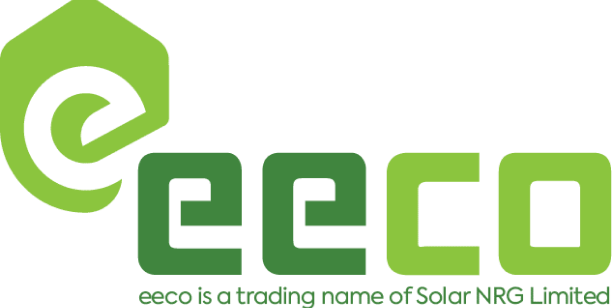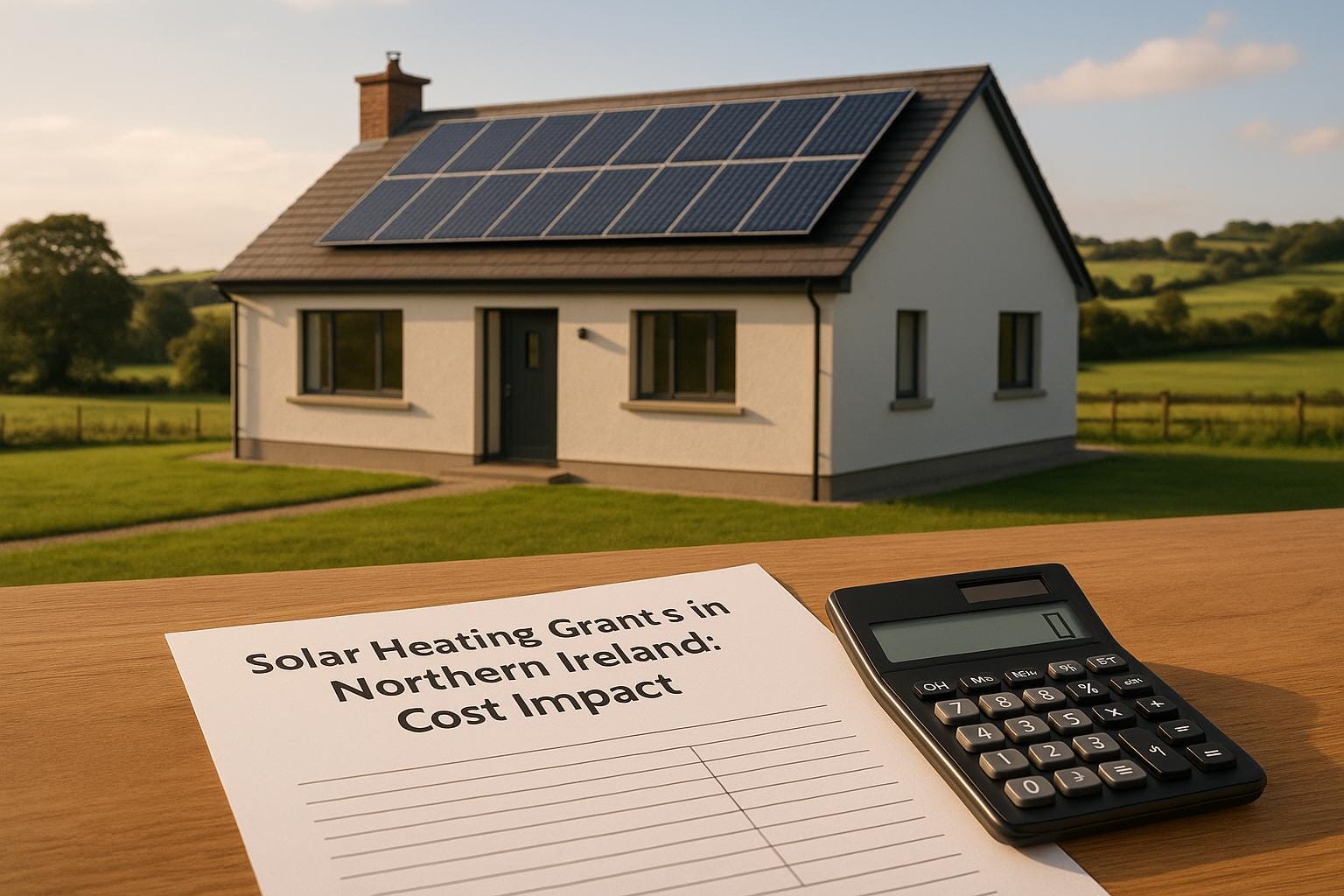In Northern Ireland, homeowners face limited financial support for solar heating systems compared to other regions. While there are no direct grants for domestic solar installations, recent initiatives like the 0% VAT incentive (introduced in May 2023) reduce costs by around £1,000. Additionally, programmes such as NISEP, Green Heat NI, and Toasty Homes offer varying levels of funding, but their scope and eligibility differ:
- NISEP: Focuses on energy efficiency measures, with grants for businesses installing solar thermal systems but no direct support for homeowners.
- Green Heat NI: Fully funds heat pump installations but excludes solar heating systems.
- Toasty Homes: Provides partial funding for domestic solar thermal projects, easing upfront costs.
Each scheme has specific criteria, funding levels, and limitations. Homeowners can combine these programmes to reduce costs but must carefully plan to meet eligibility requirements and align application timelines.
1. Northern Ireland Sustainable Energy Programme (NISEP)

The Northern Ireland Sustainable Energy Programme (NISEP) plays a crucial role in improving energy efficiency across the region. It has expanded its focus to include solar thermal systems as part of broader energy upgrade initiatives.
Eligibility Requirements
For domestic users, NISEP primarily offers support for boiler upgrades and insulation improvements. On the commercial side, funding can extend to solar thermal systems, provided applicants meet specific energy performance standards and work with approved contractors. Businesses must also demonstrate measurable energy efficiency improvements and adhere to building regulations. These requirements highlight how NISEP aligns funding with energy-saving goals.
Grant Coverage and Funding Structure
NISEP grants for commercial projects cover the costs of equipment, labour, and necessary infrastructure. While domestic applicants don’t receive direct grants for solar thermal systems, they can still benefit indirectly. Efficiency measures supported by NISEP, such as better insulation, can enhance the performance of existing or planned solar systems.
Cost Impact on Solar Heating Installations
Commercial users see a direct reduction in project costs thanks to NISEP grants, making solar thermal installations more affordable. For domestic users, the programme’s efficiency upgrades help lower overall heating demands, indirectly supporting solar heating systems.
Careful planning is key to fully utilising the benefits NISEP offers.
2. Green Heat NI
The Green Heat NI scheme is focused exclusively on supporting heat pump installations. The NISEP Green Heat NI Fully Funded Heat Pump Scheme, in particular, zeroes in on this technology, leaving solar heating systems outside its scope.
Eligibility Requirements
This scheme is tailored for households interested in installing air or ground source heat pumps. As a fully funded initiative, it offers complete financial coverage for those who meet the criteria. However, its benefits are strictly reserved for heat pump installations, with no provisions for other renewable heating systems.
It’s worth noting that, as of 31 March 2025, Refresh NI has announced that applications for the 2025/26 funding year are now closed.
Grant Coverage and Funding Structure
Green Heat NI provides full funding, covering 100% of the eligible costs associated with heat pump installations for approved applicants. This comprehensive support ensures that households can transition to heat pump technology without bearing the financial burden. However, solar thermal systems are not included in this scheme, requiring homeowners to seek alternative funding sources if they wish to pursue solar heating projects.
Cost Impact on Solar Heating Installations
By focusing solely on heat pumps, the scheme highlights the importance of exploring other funding avenues for solar thermal installations. This division makes it essential for households to weigh their renewable heating options carefully, considering the funding available for each technology.
3. Toasty Homes

The Toasty Homes scheme is aimed at helping households upgrade their heating systems by incorporating solar thermal technology. Unlike NISEP, which has a broader focus, Toasty Homes specifically supports solar thermal projects. By providing partial funding, the programme reduces the upfront financial burden, making these installations more affordable. It works alongside other initiatives to ease the financial strain of adopting renewable energy solutions.
Eligibility
To qualify for Toasty Homes, households must meet specific criteria outlined in the official guidelines. These include requirements related to home energy efficiency and heating systems, ensuring that the support reaches those who need it most.
Funding Structure
The scheme offers partial funding for installation costs, with the level of support varying depending on the applicant’s circumstances and the type of technology being installed.
Reducing Costs of Solar Heating
By covering part of the initial costs, Toasty Homes makes solar thermal installations more attainable for households. When combined with the potential for long-term energy savings, this support allows families to recover their investment more quickly.
For expert advice on funding your solar thermal installation, reach out to EECO Energy professionals.
sbb-itb-d2d975a
Pros and Cons
Each grant scheme for solar heating comes with its own set of perks and challenges. Understanding these can help you choose the funding option that best suits your needs. Here’s a breakdown of the key factors to consider:
| Grant Scheme | Advantages | Disadvantages |
|---|---|---|
| NISEP | Offers broad support for multiple renewable technologies; well-established programme with a strong track record; supports both domestic and commercial installations | Limited funding availability and highly competitive application process; strict eligibility requirements may exclude some households; longer application and approval timelines |
| Green Heat NI | Tailored for heat pump and solar thermal systems; simpler application process for qualifying technologies; prioritises high-efficiency installations | Narrower focus compared to other schemes; may include income or property type restrictions; funding might not cover the full cost of installation |
| Toasty Homes | Specifically supports solar thermal projects; partial funding helps reduce upfront costs; integrates with other energy efficiency upgrades | Restricted to certain heating system upgrades; eligibility linked to existing home energy efficiency ratings; may require additional home improvements to qualify |
These comparisons highlight how factors like funding structure, eligibility, and administrative requirements differ between schemes. Having a clear understanding of these variations is crucial for homeowners looking to make informed decisions about solar thermal investments.
Cost savings vary across schemes. Households that combine multiple grants often see the biggest financial benefits, but this approach requires careful planning and coordination. Delays in programme approvals can add complexity when trying to align funding sources.
Geographic restrictions also play a role in grant availability. Some schemes focus on rural areas or specific council districts, while others prioritise urban regeneration zones. Your postcode could significantly influence your funding options.
Eligibility and documentation requirements also differ. For instance, NISEP involves extensive assessments, whereas Toasty Homes simplifies the process by working through approved installer networks. Each scheme has its own trade-offs to weigh.
EECO Energy’s expertise can help you navigate these grants, making the process smoother and ensuring you secure the maximum funding available.
Conclusion
Choosing the right grant scheme depends on your specific needs and project goals. For comprehensive renewable energy upgrades, NISEP is a strong option, though its competitive nature means careful preparation is essential.
If you’re after a quicker and simpler process, Green Heat NI could be the ideal choice. Its emphasis on high-efficiency systems helps ensure better long-term savings and performance.
For properties requiring energy efficiency improvements along with solar thermal installation, Toasty Homes is a solid fit. This scheme tackles multiple challenges while helping to lower overall costs.
Combining multiple grants can significantly reduce expenses, but it requires precise timing and coordination. A good strategy might be to start with Green Heat NI to secure initial funding quickly, then look into additional grants to maximise your savings. This way, you can avoid the complications of missing out due to procedural delays.
EECO Energy brings valuable expertise to the table, helping you navigate the grant process efficiently. As an approved installer, they simplify applications and minimise the risks of delays or errors, ensuring you get the funding you need without unnecessary hassle.
FAQs
What financial support is available for homeowners in Northern Ireland to reduce the cost of installing solar heating systems?
Homeowners in Northern Ireland have access to initiatives like the Northern Ireland Sustainable Energy Programme (NISEP). This programme provides grants that cover part of the costs for energy-saving technologies, such as solar thermal systems. Another option is the Renewable Heat Incentive (RHI), which offers payments for producing renewable heat, helping to ease the financial burden of installation.
When these schemes are paired with expert installation services from EECO Energy, homeowners can cut energy costs, reduce their carbon emissions, and take a step closer to energy independence – all while boosting their savings.
What is the Toasty Homes scheme, and how does it help with solar thermal installations in Northern Ireland?
The Toasty Homes scheme in Northern Ireland aims to support low-income households, especially those without central heating, relying on solid fuel heating, or dealing with boilers over 15 years old that are broken or unrepairable. It’s open to both homeowners and private tenants who meet specific income and property requirements.
Through this scheme, financial aid is available for energy-saving technologies like solar thermal systems, with grants covering up to 20% of the cost. This subsidy helps lower the initial expense, making renewable heating options more affordable for qualifying households.
Can I combine different grants to lower the cost of solar heating installations, and what challenges might arise?
Yes, in Northern Ireland, you can combine multiple grants to help lower the cost of installing solar heating systems. For example, you could pair a renewable heating grant with a home insulation grant to maximise your savings. This strategy can make a big difference in reducing the upfront costs of solar heating installations.
That said, there are a few hurdles to keep in mind. Each grant comes with its own eligibility requirements, and not all schemes work well together. The application process can also be a bit lengthy and may require careful preparation to meet all the necessary criteria. Consulting with experienced professionals or approved installers can make things much easier and help you take full advantage of the support available.


